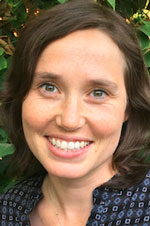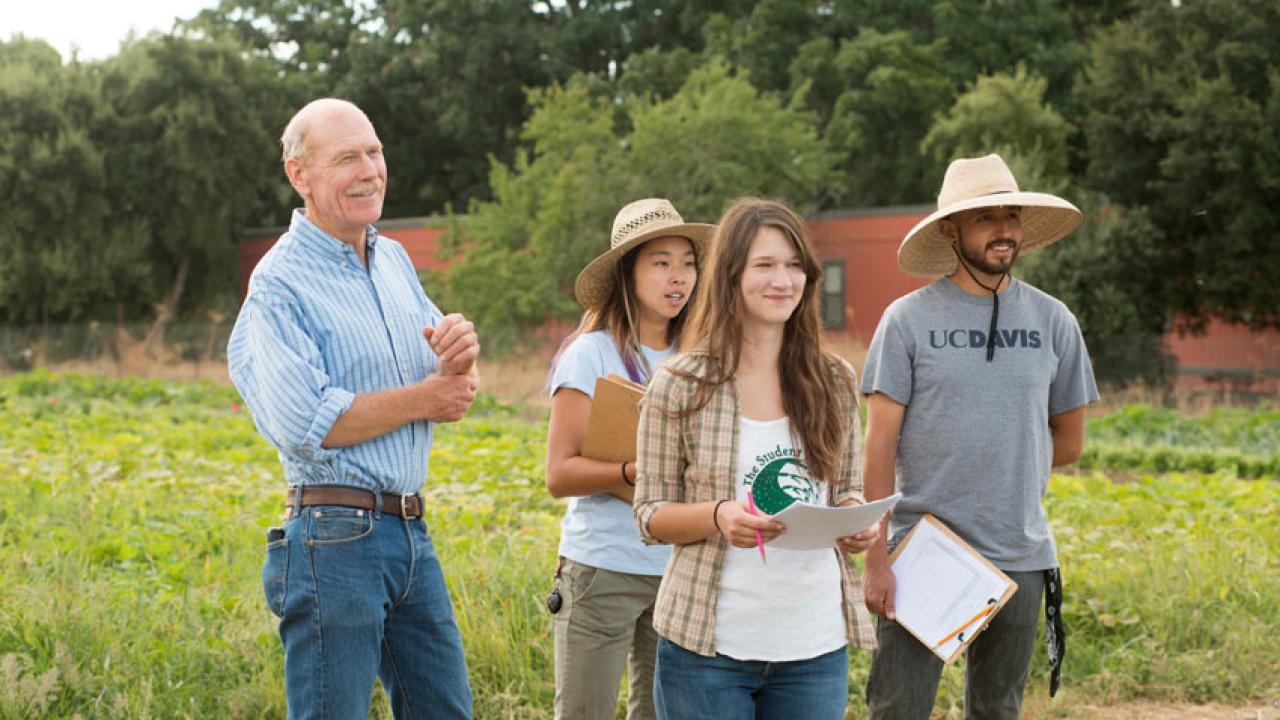Mark Van Horn, director of the Student Farm, is the recipient of the first Mark Van Horn On-Farm Educator Award, established by the Sustainable Agriculture Education Association and presented during the association’s recent biennial conference. In choosing future recipients, the association will look for them to share Van Horn’s passion for teaching sustainable agriculture and engaging students in the learning process.
In This Column
- 1st Mark Van Horn On-Farm Educator Award goes to … Mark Van Horn
- Writing specialist Linn Normand gives talk at Harvard on her new book
- Linda Harris: New president of the International Association for Food Protection
- Elizabeth Mitcham: Vice president-elect, International Division, American Society for Horticultural Sciences
Van Horn has worked at the Student Farm for 30 of its 39 years, helping to develop it into an experiential learning facility that educates more than 300 UC Davis students each year, engages elementary school students and teachers from throughout the region in garden-based learning, and provides produce to on-campus eateries and The Pantry.
Van Horn was instrumental in starting the sustainable agriculture and food systems major, now in its fifth year; he teaches three courses and sponsors dozens of interns in this and other majors.
“The award doesn’t really belong to me, it belongs to the whole community,” Van Horn said. “Without the community, I wouldn’t have gotten anything done.”
Read more in the Agricultural Sustainability Institute’s blog.
•••

Linn Normand, a writing specialist in the Student Academic Success Center, will give a talk at Harvard University this week on her recently published book, Demonization in International Politics: A Barrier to Peace in the Israeli-Palestinian Conflict.
The talk is sponsored by Harvard Law School’s Program on Negotiation and its Middle East Negotiation Initiative. Normand was a graduate research fellow in the Program on Negotiation, as well as a Herchel Smith Scholar at Harvard. She has a Bachelor of Arts in social and political sciences from the University of Cambridge, and Ph.D. in international relations from the University of Oxford.
During her visit to Harvard, she will meet with Jane Rosenzweig, the director of the Harvard Writing Center, to learn more about the center/writing program and to share practices/pedagogies.

This fall, she will work with librarians Roberto Delgadillo and Matthew Connor to organize a book exhibition around the theme of demonization.
In her book, Normand argues that while demonization’s origins are religious, its continued presence is fundamentally political. Drawing upon examples from historical and modern conflicts, she addresses two key questions: Why do leaders demonize enemies when waging war? And what are the lasting impacts on peacemaking?
In providing answers to these inquiries, Normand applies historical insight to 21st-century conflict. Specific attention is given to Israel and Palestine as she argues that war-time demonization in policy, media and art is a psychological and relational barrier during peace talks.
•••
Linda Harris, Cooperative Extension specialist in food safety and microbiology, and chair of the Department of Food Science and Technology, recently began a one-year term as president of the International Association for Food Protection. It has more than 4,000 members from more than 70 countries; the membership includes educators, government officials, food industry executives and quality control professionals who are involved in all aspects of safely growing, storing, transporting, processing and preparing all types of foods.
Harris has been on track to lead the association since being elected secretary in 2013; she then moved up to vice president and president-elect. She also has served on several committees and on the editorial board of the association’s Journal of Food Protection.
She has been a member of the association since 1987, when she was a student. She received a B.S. in food science and an M.S. in food microbiology from the University of Alberta (Edmonton), and holds a Ph.D. in microbiology from North Carolina State University in Raleigh.
•••
Elizabeth Mitcham, postharvest biologist who serves as the director of the Horticulture Innovation Lab, has been elected to office in the American Society for Horticultural Sciences. She recently began a one-year term as vice president-elect of the International Division, and after that she will serve a two-year term as the vice president.
The society is the world’s premier professional society for horticultural science. Founded in 1903, the society has more than 2,500 members — researchers, teachers and extension educators — in all 50 states and 60 countries.
Mitcham took office as vice president-elect at the conclusion of the society’s annual conference, where she gave two presentations: “International Opportunities for Research, Education and Extension in Horticulture” and “Gaining International Presence for Promotion and Tenure.”
She has a B.S. and Ph.D. in horticulture from the University of Maryland, and an M.S. in horticulture from North Carolina State University.
Mitcham, a Cooperative Extension specialist and pomologist, served as the director of the Postharvest Technology Center for nearly eight years until stepping down recently.
•••
Dateline UC Davis welcomes news of faculty and staff awards, for publication in Laurels. Send information to dateline@ucdavis.edu.
Media Resources
Dateline Staff, 530-752-6556, dateline@ucdavis.edu
